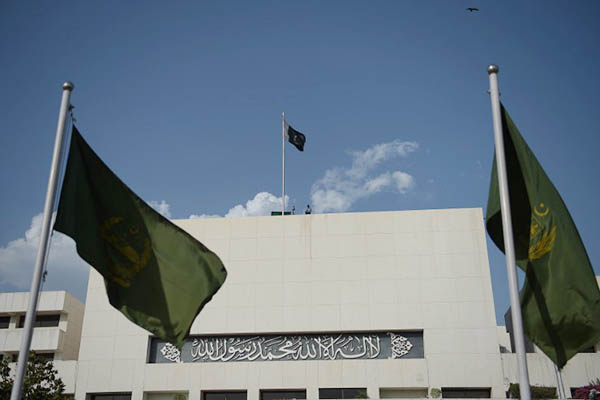
File photo. Aamir Qureshi—AFP
In rejoinder, rights organization says legislation will deprive citizens of their right to access information
The Women’s Action Forum (WAF) on Sunday condemned government lawmakers for moving the Right of Access to Information (Amendment) Act, 2021 in the Senate, claiming it sought to exclude Parliament and its various bodies from the definition of “public body,” as defined in the Right of Access to Information Act, 2017.
Moved by Pakistan Tehreek-e-Insaf Senator Waleed Iqbal, the new legislation suggests the public would not be have the right to seek information from the National Assembly and Senate, including their secretariats, committees and members. The bill argues that the constitutional sanctity provided to the secretariat of Parliament, Senate and National Assembly prevents them from being considered public bodies, similar to the Supreme Court, which is also not included in the definition of public bodies.
Claiming that the “Statement of Objects and Reasons,” for the amendment were premised on an incorrect understanding of the role of Parliament as a public body in a democracy, the WAF said that this betrayed a deeply flawed understanding of Constitutional provisions, including Article 69. “In line with other regressive laws, rules and policies that have been recently introduced to curtail the rights to expression and information, this amendment bill similarly attempts to roll back the right to information, protected under Article 19A of the Constitution,” read the organization’s statement.
According to the WAF, the right to information, safeguarded in Article 19A of the Constitution, clearly stipulates: “Every citizen shall have the right to have access to information in all matters of public importance subject to regulation and reasonable restrictions imposed by law.” It notes that the importance and scope of Article 19A was clearly laid out in Punjab by the Lahore High Court, which ruled that the right to information and access to it in all matters of public importance was a “fundamental right” guaranteed under Articles 19 and 19A of the Constitution.
Subverting the Constitution
The WAF statement maintained that in suggesting that Parliament should be excluded from the scope of the 2017 Act, the government senators were deliberately attempting to subvert the Constitutional guarantee contained in Article 19A. If this regressive amendment bill is not defeated, it warned, citizens would be deprived of their right to access information.
“We [at the WAF] urge the Senate Standing Committee on Information, before which this bill will be placed on Feb. 15, 2021, to reject this instrument,” it said. “The Parliament cannot be excluded from the scope of the 2017 Act as without information from or relating to, the Parliament and Parliamentary debates, procedures and business, the citizens of Pakistan cannot make informed and responsible decisions regarding their collective future,” it added.
Stressing that enacting this amendment would hamper the quality of political discourse, and ultimately lead to a reduction in the political participation of citizens in matters of public importance, the WAF warned that of a “devastating impact” on Pakistan’s “already fragile democracy” if it were not dismissed.
According to the WAF, Parliament’s key functions of lawmaking, determining the national budget, discussion on issues of public importance and concern, and monitoring and oversight render it illogical and unconstitutional to exclude it from the scope of the 2017 Act. “It is unfortunate that instead of respecting fundamental rights and abiding by the Constitution, this government chooses to supersede the Parliament by legislating via ordinances,” it said, adding that the ruling party’s members often present bills that seek to curtail the rights guaranteed by the Constitution.
“This amendment bill is yet another attempt to limit transparency and accountability with respect to state action. Parliament is accountable to the citizens of Pakistan. Therefore, we need greater transparency vis-à-vis its workings and decision-making at all levels,” read the statement. “No public representative or a public body should be above scrutiny and accountability,” it said, lamenting that the incumbent government appeared to believe everyone but its own members should be subjected to accountability. “The WAF unequivocally condemns such selectivity and authoritarian moves and accordingly demands that this bill be withdrawn immediately,” the statement added.
The WAF is a women’s rights organization in Pakistan that has been lobbying for them since 1981.
